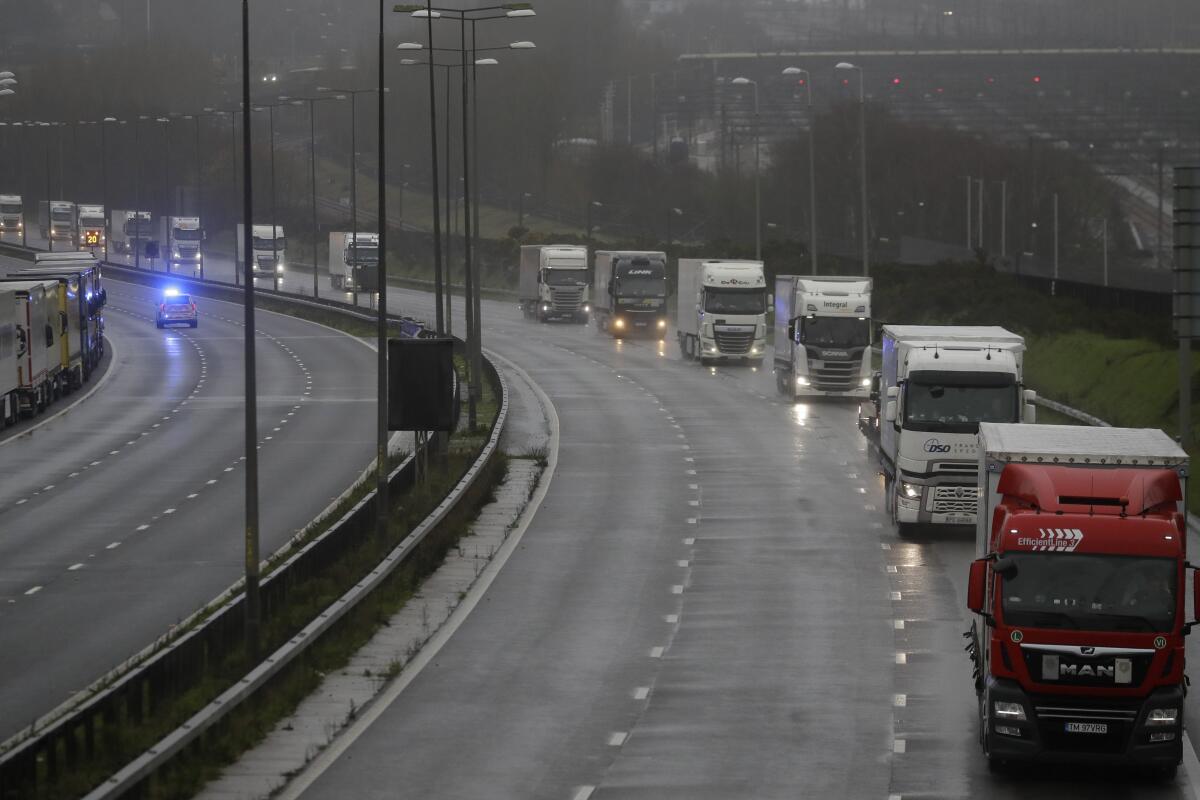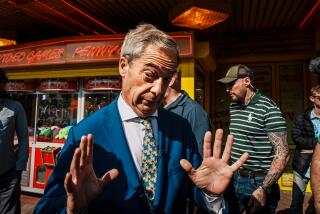Op-Ed: As Brexit crashes into COVID-19, Britain braces for a harrowing end to 2020

- Share via
LONDON — British Prime Minister Boris Johnson bungled the management of the country’s COVID-19 pandemic over the course of the summer and fall. This week, with a new, more contagious strain of the coronavirus raging in Britain, cases are soaring and deaths have topped 67,000.
Now Johnson is on the verge of an even more momentous misstep: Failure to orchestrate the final terms for Britain’s smooth exit from the European Union, which could do worse long-term damage to the economy than the coronavirus.
Just this weekend, Britons got a taste of what life would be like if Johnson does not strike a trade deal with the EU in the coming days. On Sunday, France, responding to news of the new mutant virus, moved to block all trucks traveling from England to France. Supermarkets were mobbed, with crowds casting aside COVID-19 protocols to stock up on food after newscasts showed trucks backed up for miles trying to get out of the port of Dover, through which 10,000 trucks pass every day carrying goods and food.
A headline on an opinion column in the left-leaning Guardian newspaper Monday pronounced doom for Johnson and his Conservative Party: “It’s Boris Johnson’s worst week.”
The political implosion actually started Saturday evening. After months of mixed and confused messaging about COVID-19 from the government, Britain has one of the highest death rates in Europe. Last week, Johnson was still insisting that it was safe to have “a merry little Christmas” under relaxed rules for family gatherings over the holidays, despite warnings from public health experts. On Saturday, he did a U-turn.
Now, in some parts of England, including London, where the surge of cases is out of control, there will be no Christmas celebrations. Not even a little one. And the outlook for the new year is grimmer. Tighter restrictions are likely, the country’s chief scientific advisor warned Monday evening.
The pandemic has inflicted indiscriminate damage on the world’s economies, but Britain faces its own peculiar challenge in the months ahead.
Four years ago, Britons voted in a national referendum to leave the European Union. The tortured process — set in motion by dubious promises, wishful thinking and nationalist fervor — will come to a crashing end with Britain expected to finalize the terms of its departure from the EU on Jan. 1, with or without a trade agreement.
Brexiteers staked the country’s future on Johnson, believing that he, unlike his predecessor Theresa May, could negotiate an exit from the EU that would allow Britain to have the benefits of Brexit — such as an end to paying into the EU budget and control of immigration rules and business regulations — without the disadvantages of leaving the single market.
If no deal is reached by Dec. 31, EU tariffs could be slapped on countless English exports while Britain could levy tariffs on imported goods, from German cars to Spanish oranges. The economic pain and chaos brought on by a no-deal Brexit could be severe. Recent research from King’s College London predicted a sharp drop in per capita income under Johnson’s proposed deal compared with staying in the EU.
According to research published by the Centre for Economic Performance at the London School of Economics, more than half of British businesses surveyed in October said that uncertainty on future arrangements between the United Kingdom and the EU limited their ability to prepare for Brexit. This is higher than the proportion of businesses that cited the pandemic as hindering their preparation.
Some 41% of businesses polled described themselves as unprepared for a no-deal Brexit and a majority of businesses (nearly 70%) said a scenario where no trade deal is struck will harm them.
Brexit is expected to usher in substantial changes to the way companies do business. New custom checks could mean border delays that have already proved disruptive, not to mention price changes and exchange rate volatility that businesses typically plan for months in advance.
After the vote to leave the EU in 2016, the British currency plummeted, sparking a rise in the costs of imported materials with no offsetting increase in export revenues. Businesses appear to be concerned that this may happen again, the Centre’s economists wrote.
This looming catastrophe makes it hard to understand why Johnson and his policy wonks are willing to risk a deal for the sake of a very small sector — Britain’s fishing industry.
The two sides are reported to be in agreement on 98% of the terms of a pact. The main sticking point involves access that EU fishermen will have to U.K. waters after Britain finalizes its departure from the union.
Fighting for fishermen plays well among Johnson’s base, but exhibits the worst kind of economic myopia. The British department store, Harrods, with more than 2 billion pounds in total sales in 2016, is arguably more critical to the U.K. economy than the fishing industry, which was then valued at 725 million pounds, as the Financial Times has pointed out. In 2018, fishing accounted for 0.05% of total domestic output.
Since Britons voted to leave the European Union, the country has cycled through leaders. David Cameron, who sought the referendum and supported remaining in the European Union, resigned on the day of the referendum result.
His successor, May, who also voted to remain, succeeded in negotiating a withdrawal agreement with the EU, only to resign when it became clear that she would fail to win parliamentary support for her deal. As she said then, a consensus in Parliament could only be reached “if those on all sides of the debate are willing to compromise.”
As Britain approaches Brexit Day in the midst of a global pandemic, wagers are mounting that Johnson, who won a commanding victory at the polls in 2019 by promising voters to “Get Brexit Done,” may ultimately find that it is Brexit that gets him undone.
Anita Raghavan is the author of “The Billionaire’s Apprentice: The Rise of the Indian-American Elite and the Fall of the Galleon Hedge Fund.”
More to Read
A cure for the common opinion
Get thought-provoking perspectives with our weekly newsletter.
You may occasionally receive promotional content from the Los Angeles Times.










